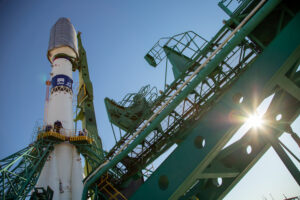Soyuz-2 rideshare launch delayed for South Korea, Astroscale, dozens more
By Brian Berger

SEOUL, South Korea — The launch of a Soyuz-2.1a rocket carrying a South Korean remote sensing satellite and three dozen smaller satellites was delayed Saturday due to a problem with the rocket’s upper stage, according to South Korea’s Ministry of Science and ICT, the primary customer for the GK Launch Services-brokered commercial rideshare mission.
The ministry said a “Fregat control system problem” had been detected during a last-minute check up of the three-stage rocket, which was scheduled to lift off from Russia’s Baikonur Cosmodrome in Kazakhstan at 11:07 a.m. local time (2:07 a.m. EDT) with 38 satellites from 18 countries onboard, including its primary passenger, the 500-kilogram CAS500-1 remote sensing satellite for the Korea Aerospace Research Institute (KARI), South Korea’s space agency.
The delay was announced about 15 minutes before the scheduled launch time.
“The launch will be rescheduled after an examination of the problem’s cause and a round of checkup are conducted,” the ministry said in a statement.
The chief of Roscosmos, the Russian state space corporation, confirmed the delay. “There was a power surge, and we decided not to risk it [the launch],” Dmitry Rogozin said, according to a Russian media report. He didn’t give further details.
GK Launch Services, a subsidiary of the Russian space agency’s commercial division Glavkosmos, which has arranged the launch, was not immediately available for comment.
The launch is postponed. We will get back to you later with details.
Пуск перенесен. Мы сообщим вам о деталях позднее. pic.twitter.com/eFYVig4qwa— GK Launch Services (@gk_launch) March 20, 2021
In a brief statement posted on Twitter, the company said: “The launch is postponed. We will get back to you later with details.”
The Fregat upper stage allows the Soyuz-2 rocket to deliver up to 4,800 kilograms of payload mass to a sun-synchronous orbit.
South Korea’s CAS500-1 — the first of at least two 500-kilogram-class Compact Advanced Satellite 500 spacecraft KARI plans to launch — is designed operate from a roughly 500-kilometer sun-synchronous orbit to provide high-resolution color and multispectral imagery of the Earth.
Among other payloads onboard the rocket is Tokyo-based Astroscale’s ELSA-d satellites. Short for End-of-Life Services by Astroscale-demonstration, a pair of ELSA-d spacecraft will perform the company’s first end-to-end test of key technologies for removing space junk from orbit. Astroscale is counting on the ELSA-d mission to accelerate government policies around the world for addressing orbital debris and drive the business case for related in-orbit services.
Also onboard the Soyuz-2.1a awaiting launch is the first nanosatellite for Sateliot, a Spanish Internet of Things startup that aims to deploy a constellation of such satellites in low Earth orbit to help terrestrial 5G network operators connect “permanently or occasionally uncovered devices” owned by enterprise customers.
Sateliot recently outlined ambitions to generate €236 million ($282 million) in revenue by 2025 with a constellation of up to 100 satellites, connecting devices for applications ranging from environmental monitoring to logistics.
The startup, which tapped U.K.-based Open Cosmos in 2020 to build and operate its constellation, said it has raised a €5 million series A funding round to support this launch and early research and development. It is planning another funding round to deploy 16 more satellites to launch commercial services by 2022-2023.
Other payloads onboard the launch include tiny satellites for private ventures Axelspace, Hiber, Kepler Communications and Lacuna Space and numerous cubesats for universities and research institutions from around the world.
SpaceNews senior staff writer Jason Rainbow contributed to this story from Florida.
March 20, 2021 at 06:25PM
via SpaceNews read more...

Post a Comment